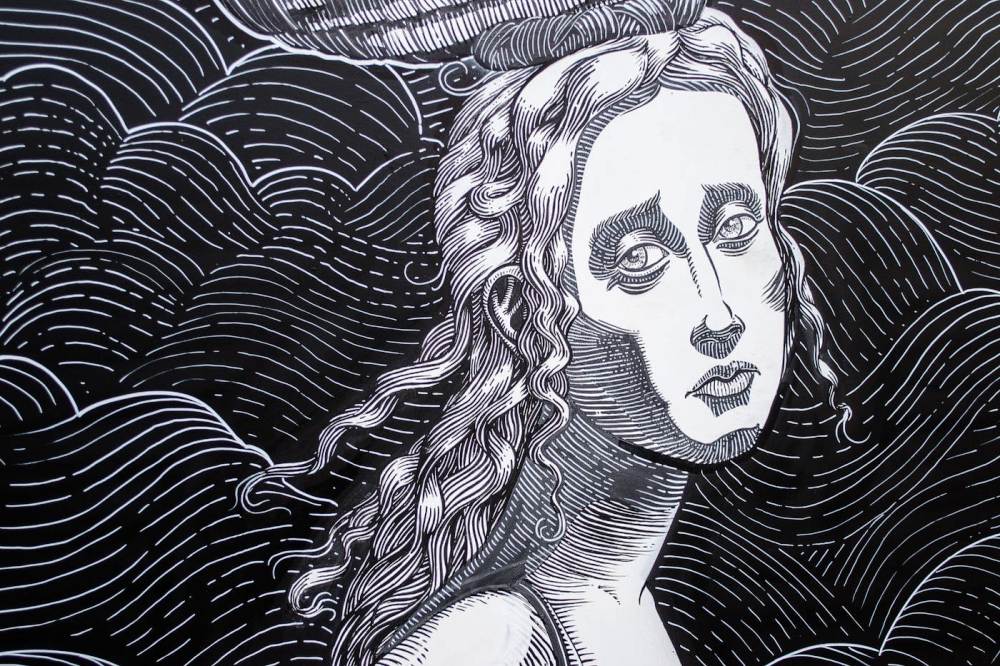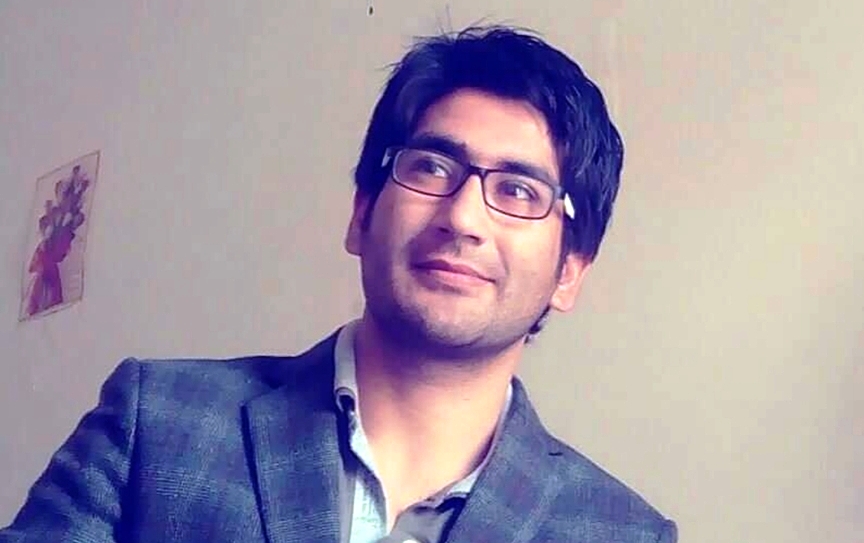by Ghulam Mohammad Khan
“We must suffer to the end, to the moment when we stop believing in suffering.”
Emile M Cioran

Remarkably, we possess the ability to think, yet equally disheartening that we are susceptible to suffering. Happiness, in its true essence, does not exist in isolation. It necessitates its indispensable counterpart, for its significance would be impossible without its binary companion. We engage in thought, we take action, and consequently, we experience pain.
Suffering arises from the incongruity between our thoughts and actions; there are instances when our actions fail to align with our thoughts, and conversely, our thoughts do not correspond with our actions. Before manifesting as actions, our thoughts journey through a vast realm of emotions and feelings. While thoughts and actions may transiently appear and fade away, the residue of pain they leave in their wake endures indefinitely. Moments of happiness, too, fleetingly pass us by, dissipating like cotton engulfed in flames.
Life, in its entirety, can often feel like an investment in suffering, with only fleeting moments of happiness as the return. In our pursuit of happiness, we exert all possible efforts, subjecting ourselves to immense hardship. Yet, when that transient moment of joy arrives, we tend to forget the pain endured and embark on a fresh journey, seeking further happiness.
Acknowledging that suffering is inevitable does not imply pessimism or an intransigent outlook on life. Similarly, acknowledging the potential for optimism or the belief that discovering inherent meaning in life can lead to true or everlasting happiness is not unfounded either. The coexistence of mutually antagonistic beliefs is a separate topic.
Suffering is inherent and deeply woven into the fabric of our existence. From the moment of birth until our eventual passing, life shapes itself without granting complete freedom. Even if one were to achieve freedom, the secret or the knowledge of eternal happiness remains elusive. Slowly, living becomes entangled with various associations that significantly influence its course, imperceptibly sewing suffering into its very form.
Suffering slowly wields immense power and control, subtly reducing the true purpose of life to mere acts of braving and overcoming it. It may sound absurd, but many of our plans and actions, to which we willingly and sometimes unconsciously submit, are small attempts to escape from pervasive suffering.
To understand suffering, it is necessary to understand its underlying causes. When we search for the causes, we will undoubtedly encounter the associations and attachments we form as living beings; even abstract associations have the potential to cause suffering. Our attachments, much like suffering, are inevitable and challenging to avoid. Although attachments are necessary in the places we are born, we tend to accumulate them without complaining about the suffering they may bring. However, does this imply that complete detachment can eradicate suffering?
Not quite. As living without any attachment is nearly impossible. All attachments don’t always bring suffering. However, it would be hard to contend that some attachments do not bring any suffering at all. Even if we detach, like the example of a recluse or a mountain hermit, it is often for a different form of attachment. It remains an undeniable reality, as clear as daylight. However, in acknowledging that suffering is an indispensable part of life, we can explore ways to minimize its impact on us. Can we achieve this?
Suffering can’t be solely defined as someone undergoing pain or distress at a given moment. It pervades every moment, even when we don’t feel we are suffering. The greatest suffering lies in the willingness to readily, without grumbling, accept and undergo hardship to attain a moment of happiness. First of all, with clarity of mind, we must acknowledge that suffering is not easily conquerable, echoing the words of the Austrian poet Rilke, who described it as “stubbornly imperishable.” Rilke also believed that suffering persists, remains inaccessible yet clings on, envious of everything else and stuck in its terrible reality.
The profound understanding that suffering is nearly invincible or an inherent part of the human experience allows us to embrace its presence, much like we do with our attachments unconsciously, and enables us to develop resilience and a greater sense of compassion for ourselves and others. This awareness transforms suffering into something we can endure. When we acknowledge its inevitability, we can approach it with a more balanced perspective, accepting its presence without succumbing to despair.
Arthur Schopenhauer, the renowned German philosopher, argues against the absurdity of viewing the widespread pain in the world as purposeless or random, as it is inseparable from life’s inherent needs and necessities. While individual misfortunes may seem exceptional, suffering itself is a common aspect of existence. Schopenhauer challenges the notion presented in many philosophical systems that evil is merely negative, asserting instead that it possesses a positive, tangible presence.
It is essential to clarify that the intention here is not to advocate for or celebrate suffering, but rather to discourage the condemnation or rejection of suffering as inherently evil or divinely ordained retribution for sin. An alternative perspective on suffering invites us to appreciate it in a Keatsian manner. In his poem Ode on Melancholy, Keats beautifully employs the metaphor of rain falling to depict sadness enveloping an individual. Just as rain is essential for the survival and beauty of ‘droop-headed flowers,’ suffering can also serve a purpose in our lives. While it may seem to weigh upon us like rain on petals, it can lead to growth, resilience, and a deeper appreciation for the joys that follow.
Embracing suffering not as an inherently negative force, but as a part of life’s transformative journey, can lead us to find meaning and strength in the face of adversity. While the notion of appreciating suffering in a Keatsian way might resonate with some, it may seem shallow to those who find themselves overwhelmed and unable to cope with persistent suffering.
Even if individuals manage to emerge from a particularly difficult phase of anguish, it does not guarantee immunity from future hardships. Regrettably, suffering can persist, making it a formidable challenge to confront. Therefore, suffering calls for a positive approach and appreciation rather than denial or disdain as this can only exacerbate its impact. Allow me to quote Schopenhauer once more:“Long you must suffer, knowing not what, until suddenly out of spitefully chewed fruit your suffering’s taste comes forth in you. Then you will love almost instantly what’s tasted. No one will ever talk you out of it.”
While it is not entirely impossible to prevent attachments from forming, it is also true that they can develop despite our efforts to avoid them. While some suffering may arise from natural causes like disease or natural calamities, a significant portion of our suffering emanates from these attachments. It is important to acknowledge that we cannot entirely escape the potential suffering that attachments may bring at any point in time. However, by gaining a deeper understanding of the true nature of these attachments, we can work towards minimizing their impact on our lives.

Our attachments and their potential to cause emotional pain to operate within a complex ‘symbolic order’ inherent in human society. This symbolic order is, in essence, an intricate network of signifying codes that seemingly influence the formation and nature of our attachments in a seemingly natural sequence. Understanding the profound influence of this ‘symbolic order’ can offer insights into the nature of human connections and how we navigate the potential pain that accompanies our attachments.
By exploring these complexities, we can strive to foster healthier and more meaningful attachments while acknowledging the profound role of society in shaping our emotional landscapes. While we remain bound to enact our roles within this intricate symbolic system and inevitably experience suffering, we can come to comprehend that the very framework governing our attachments is fundamentally constructed. This awareness has the power to shift our perceptions and enable us to evade deeper entanglements with such associations.
Life’s intertwined reality of thinking, action, and suffering poses a profound paradox. We must acknowledge the inevitability of suffering, yet understanding its underlying causes and appreciating its transformative potential can offer resilience and compassion. Moreover, by comprehending the nature of attachments and their influence on our emotional landscape, we can strive to navigate life’s complexities with greater awareness and minimize the impact of suffering on our journeys.
(Ghulam Mohammad Khan is young writer from Sonawari, Bandipora. His short story collection ‘The Cankered Rose’ is forthcoming. Ideas are personal.)














